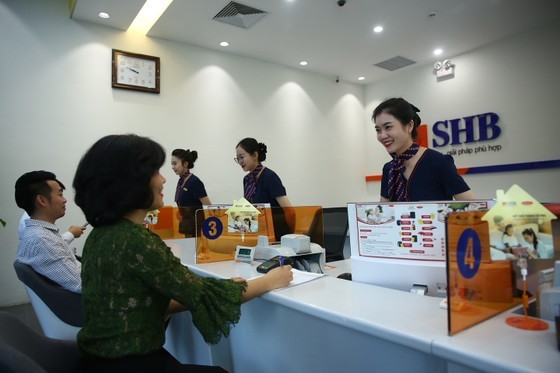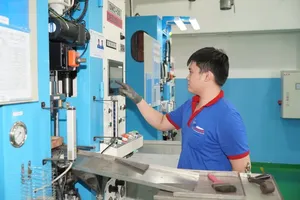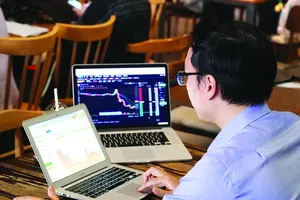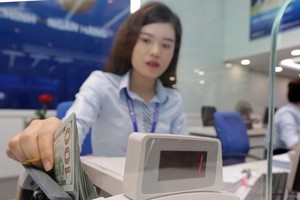 |
Credit grows 4.03 percent in first seven months |
To achieve the set target, from now until the end of the year, commercial banks will have to increase the supply of more than VND1.1 quadrillion (US$ 46,450,230,136) to the economy by lowering interest rates, which spurs investment, and through putting more money in the hands of consumers, making them feel wealthier, and thus stimulating spending.
Poor capital absorption
The lending interest rate in commercial banks in July 2023 showed that has decreased from 0.5 percent-2 percent compared to the beginning of the year, but the credit expansion of the banking system goods still faced difficulties.
Standing Deputy Governor of the State Bank of Vietnam (SBV) Dao Minh Tu said that the economic situation and businesses are facing many difficulties including a shortage of orders, and exports decrease leading to a decline in investment and consumer demand; thus, credit demand is low.
On the contrary side, commercial banks want to increase credit because they will face difficulties when they have mobilized capital without lending out. Outstanding loans from commercial banks are still very much, but in the current context, many businesses not only do not borrow more but also pay back the amount borrowed before. The government and the State Bank are determined to find all solutions to solve difficulties for businesses and increase consumers’ demand for credit, said Mr. Dao Minh Tu.
Suffering the same fate, the credit growth of the first 6 months of 2023 in Ho Chi Minh City also only increased by 3.5 percent compared to the end of 2022, about one-third growth compared to the same period last year.
According to Mr. Nguyen Duc Lenh, Deputy Director of the State Bank of Vietnam in a branch in Ho Chi Minh City, this growth rate is in line with the economic growth in the southern metropolis and difficulties from capital absorption of enterprises, cooperatives and households businesses in the city. In particular, the export market, trade activities, services, tourism and real estate market have been experiencing difficulties that have a direct impact on credit growth.
Due to low credit growth and excess capital, commercial banks have simultaneously launched many preferential interest rate packages for both business and consumer loans to stimulate credit demand.
Specifically, Saigon Hanoi Commercial Joint Stock Bank (SHB) launched VND6,000 billion preferential interest rate packages for corporate customers to supplement short-term working capital with an interest rate of 8.97 percent a year and VND 1,000 billion for corporate customers with an interest rate of 9 percent-10.8 percent a year. Vietnam Maritime Commercial Joint Stock Bank (MSB) boosted credit packages for business loans at 10.5 percent a year and real estate loans at 10.99 percent a year.
Commercial Bank for Investment and Development of Vietnam (BIDV) provides VND 20,000 billion in loans to buyers of commercial houses with interest rates from 8.5 percent a year for investors and from 7.8 percent a year for home buyers. The Vietnam Bank for Agriculture and Rural Development, better known as Agribank, has also reduced interest rates on new loans for production and business with short-term interest rates of 5 percent a year and medium and long-term interest rates from 8 percent per annum.
Loosen room, speed up the lending
Since the economic growth in the first 6 months of the year was lower than the proposed scenario, there have been difficulties in the supply of capital sources to business and production, the SBV has recently decided to increase credit room in 2023 for credit institutions with a system-wide delivery rate of about 14 percent.
Accordingly, it is estimated that from now until the end of the year, the banking system will have to net more than VND1.1 quadrillion into the economy, doubling the credit level in the first 6 months of the year. Although the credit room of each bank was not officially publicized, it is known that Vietinbank, BIDV and Vietcombank are allowed to expand the room up to 14 percent; even, two other private commercial banks are also allowed to open rooms up to 23 percent-24 percent.
Facing a series of macro-management moves in banking and finance, economic experts said that the SBV allocating all credit room in the middle of the year instead of dividing it into several installments like in previous years could help banks accelerate to fulfill the assigned growth rate. However, it is important to improve the economy’s capital absorption capacity for the effectiveness of reduction in lending interest rates.
Mr. Nguyen Duc Do, Deputy Director of the Institute of Financial Economics - Academy of Finance, assessed that the policy of reducing interest rates only has a stimulating effect on demand to a certain extent, but not enough for businesses to borrow capital to expand their business due to a decline in the world economy and a drop in exports, the demand for loans has shrunken; It is necessary to continue focusing on exploiting domestic demand to promote economic growth.
Mr. Can Van Luc, BIDV's chief economist, also said that the promotion of public investment disbursement will play a positive role to spread to other production and business activities, and stimulating domestic consumption demand. In addition, the government needs to support businesses that are negatively affected by the decline in exports, investment, and consumption by better exploitation of signed free trade agreements, trade promotion, and connectivity of supply and demand. Furthermore, the government should drastically remove major obstacles and barriers for businesses in accessing capital, legal issues, and output markets.
The government has just directed the SBV to continue implementing synchronous and drastic solutions to reduce the interest rates, especially the lending interest rate, striving to reduce at least 1.5 percent-2 percent for both new and outstanding loans.
























